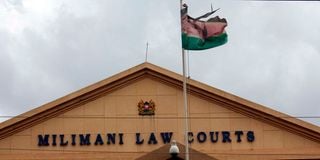Premium
Kenyans, foreigner step up fight over Sh2.3bn

The Milimani Law Courts in Nairobi. The Sh2.3 billion under dispute are being held at Ecobank.
The battle to control Sh2.3 billion held at Ecobank and initially frozen by the authorities over allegations of money laundering, has taken a fresh twist after a foreigner described three Kenyans, who are former directors of a firm at the centre of the row and are laying claim to the funds, as strangers.
In an application to be heard tomorrow, Mr Gregory Schmidt wants High Court judge David Majanja to reverse a ruling allowing the Kenyans — Mr Stephen Maina Njenga, Mr Felix Rantu Lekishe and Mr Solomon Joseph Maina — to access the three bank accounts.
“The petitioners (Kenyans) have approached the court on falsehoods and misrepresentation,” said Mr Schmidt.
The Kenyans blocked the release of the money after it emerged that Assets Recovery Agency (ARA) was planning to withdraw the application for seizure.
Mr Schmidt says Mr Njenga had obtained a court order for status quo to be maintained regarding the directorship of KiwiPay Kenya Ltd, yet they had already resigned as directors of the company.
Later last month, the Kenyans secured another order authorising Mr Njenga to access the company’s accounts but Mr Schmidt claimed it was obtained through misrepresentation of facts.
Mr Schmidt, who holds a French passport, now wants the court to review the order so that he can retrieve the funds to cater for day-to-day operations of the firm and payments of salaries.
He said he could not transact on behalf of the parent company registered in Singapore, which has the controlling shares in the Kenyan company.
“The petitioners became strangers to the company once they signed letters and affidavits of resignation as directors and deed relinquishing their shareholding,” asserted Mr Schmidt.
Further, he revealed that as at June 8, 2020, the shareholding at KiwiPay Kenya Ltd were; KiwiPay PTE (the mother company) 51 per cent, Ms Monthida Rashi from Laos (Southeast Asian country) 20 per cent, while Mr Njenga, Mr Lekishe and Mr Robert Lemerketo and Mr Karimoni each holding 7.5 per cent shares.
According to Mr Schmidt, shares for KiwiPay Kenya were held by Mr Lemerketo. The two were also appointed as the company directors.
In August 9, 2021, Mr Schmidt said Ms Rashi and Mr Njenga allegedly signed a board resolution giving him full access to the bank accounts of KiwiPay Kenya Ltd. This allowed him to transact the accounts without limitation.
There were more developments in May as Mr Lemerketo transferred all his shares to KiwiPay PTE Ltd, making the company registered in Singapore, the largest shareholder with 23,000 shares out of 40,000 in the Kenyan company.
The parent company allegedly deals with digital payment services such as QR Code solutions for retail shops, hotels and restaurants. It enables foreign e-wallet solutions such as Alipay, SamsungPay, ApplePay, WeChatPay and more.
While applying to freeze the money in June, ARA had suspected that the company was involved in credit and debit card fraud and was part of an international syndicate. The state agency said the firm was involved in an intricate money laundering scheme to hide the source of illicit funds
But last Monday, the High Court adopted a consent withdrawing the application for seizure of the funds.
The lumpsum is, however, yet to be released following a petition by Mr Njenga and two others before the High Court pending the resolution of their case. There have been attempts to have the money released but the bank cannot transfer it until the court cases are resolved.
Mr Njenga says in an affidavit that they should be bought out, if the parent company – KiwiPay PTE Ltd – no longer requires them as owners of the firm.
“The 1st (KiwiPay PTE) and 2nd (Ms Rashi) respondents are hereby directed to buy out petitioners from the 4th respondent [KiwiPay Kenya], if the 1st and 2nd respondents are desirous of remaining the sole shareholders of the 4th respondent,” said Mr Njenga in an affidavit.
Mr Schmidt stated that the Kenyans resigned voluntarily as shareholders of the company in April and were paid for their shares.
The Frenchman has attached letters of resignation and statutory declarations effecting the resignations as well as a copy of CR12 showing the current directors and shareholding of the company.
“The resignation and transfer of shares were signed without duress and properly witnessed. The petitioners went further to take pictures with Ms Rashi, clearly showing that they had transferred shares and that they had been paid,” Mr Schmidt said. The foreigner insists that the Kenyans have no authority to file the case “because they are strangers after resigning”.
“The assertion by the petitioners that they were removed is false. The true position is that they voluntarily resigned as directors and shareholders,” stated Mr Schmidt.
Mr Njenga further accused Mr Schmidt, who is also the chief executive officer of the parent company, of transacting in the three bank accounts.
He further claimed that Mr Schmidt transferred up to $17 million (Sh2 billion) from the company in Kenya and wired it to a bank account in Singapore, through internet banking between October last year and March 9.
The Kenyans declared a dispute against Mr Schmidt and Ms Rashi for allegedly misusing the company’s internet banking credentials to irregularly withdraw money.
They have also said their removal as directors and shareholders is unlawful because the process for their ouster was not followed as required under the Companies Act.
Mr Schmidt has threatened to file criminal charges against the Kenyans ‘at an appropriate time’ for alleged fraud and falsification of documents.





